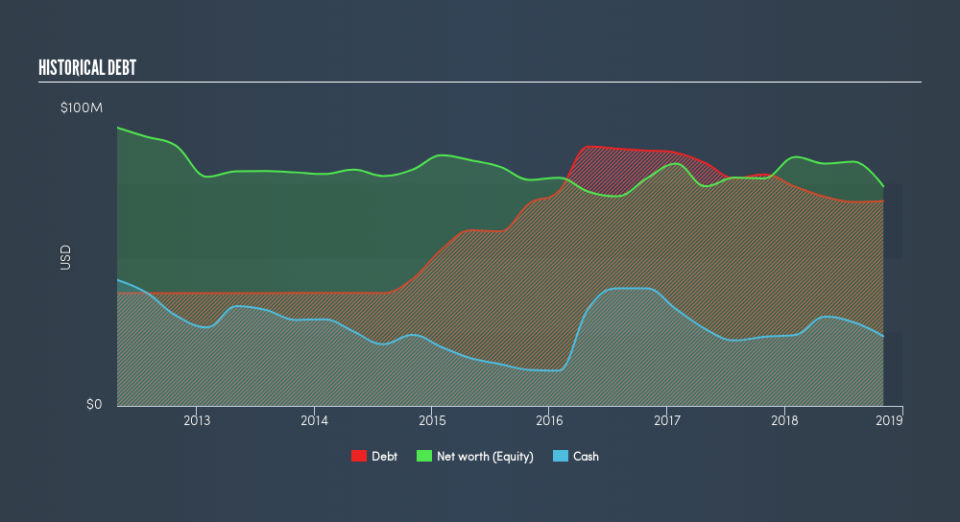Is EVINE Live Inc.’s (NASDAQ:EVLV) Balance Sheet Strong Enough To Weather A Storm?

Want to participate in a short research study? Help shape the future of investing tools and receive a $20 prize!
Investors are always looking for growth in small-cap stocks like EVINE Live Inc. (NASDAQ:EVLV), with a market cap of US$35m. However, an important fact which most ignore is: how financially healthy is the business? Online Retail businesses operating in the environment facing headwinds from current disruption, in particular ones that run negative earnings, are more likely to be higher risk. Assessing first and foremost the financial health is essential. I believe these basic checks tell most of the story you need to know. However, given that I have not delve into the company-specifics, I recommend you dig deeper yourself into EVLV here.
Does EVLV produce enough cash relative to debt?
Over the past year, EVLV has reduced its debt from US$78m to US$69m , which includes long-term debt. With this reduction in debt, EVLV currently has US$24m remaining in cash and short-term investments for investing into the business. Additionally, EVLV has generated cash from operations of US$7.7m in the last twelve months, leading to an operating cash to total debt ratio of 11%, indicating that EVLV’s current level of operating cash is not high enough to cover debt. This ratio can also be interpreted as a measure of efficiency for unprofitable businesses since metrics such as return on asset (ROA) requires positive earnings. In EVLV’s case, it is able to generate 0.11x cash from its debt capital.
Can EVLV pay its short-term liabilities?
With current liabilities at US$106m, it appears that the company has maintained a safe level of current assets to meet its obligations, with the current ratio last standing at 1.82x. Generally, for Online Retail companies, this is a reasonable ratio as there’s enough of a cash buffer without holding too much capital in low return investments.
Can EVLV service its debt comfortably?
With a debt-to-equity ratio of 93%, EVLV can be considered as an above-average leveraged company. This is not uncommon for a small-cap company given that debt tends to be lower-cost and at times, more accessible. However, since EVLV is presently loss-making, sustainability of its current state of operations becomes a concern. Running high debt, while not yet making money, can be risky in unexpected downturns as liquidity may dry up, making it hard to operate.
Next Steps:
EVLV’s high cash coverage means that, although its debt levels are high, the company is able to utilise its borrowings efficiently in order to generate cash flow. This may mean this is an optimal capital structure for the business, given that it is also meeting its short-term commitment. I admit this is a fairly basic analysis for EVLV’s financial health. Other important fundamentals need to be considered alongside. I suggest you continue to research EVINE Live to get a better picture of the small-cap by looking at:
Future Outlook: What are well-informed industry analysts predicting for EVLV’s future growth? Take a look at our free research report of analyst consensus for EVLV’s outlook.
Historical Performance: What has EVLV’s returns been like over the past? Go into more detail in the past track record analysis and take a look at the free visual representations of our analysis for more clarity.
Other High-Performing Stocks: Are there other stocks that provide better prospects with proven track records? Explore our free list of these great stocks here.
We aim to bring you long-term focused research analysis driven by fundamental data. Note that our analysis may not factor in the latest price-sensitive company announcements or qualitative material.
If you spot an error that warrants correction, please contact the editor at editorial-team@simplywallst.com. This article by Simply Wall St is general in nature. It does not constitute a recommendation to buy or sell any stock, and does not take account of your objectives, or your financial situation. Simply Wall St has no position in the stocks mentioned. Thank you for reading.

